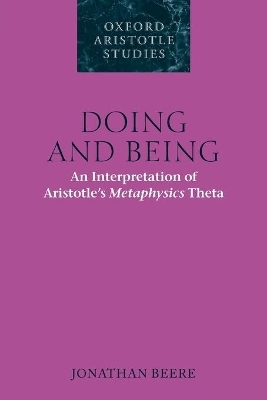
Doing and Being
An Interpretation of Aristotle's Metaphysics Theta
Seiten
2012
Oxford University Press (Verlag)
978-0-19-965204-4 (ISBN)
Oxford University Press (Verlag)
978-0-19-965204-4 (ISBN)
Doing and Being confronts the problem of how to understand two central concepts of Aristotle's philosophy: energeia and dunamis. These terms seem ambiguous between actuality/potentiality and activity/capacity, but Aristotle did not intend this. Beere's careful reading of Metaphysics Theta shows the way to an analogical conception of energeia.
Doing and Being confronts the problem of how to understand two central concepts of Aristotle's philosophy: energeia and dunamis. While these terms seem ambiguous between actuality/potentiality and activity/capacity, Aristotle did not intend them to be so. Through a careful and detailed reading of Metaphysics Theta, Beere argues that we can solve the problem by rejecting both "actuality" and "activity" as translations of energeia, and by working out an analogical conception of energeia. This approach enables Beere to discern a hitherto unnoticed connection between Plato's Sophist and Aristotle's Metaphysics Theta, and to give satisfying interpretations of the major claims that Aristotle makes in Metaphysics Theta, the claim that energeia is prior in being to capacity (Theta 8) and the claim that any eternal principle must be perfectly good (Theta 9).
Doing and Being confronts the problem of how to understand two central concepts of Aristotle's philosophy: energeia and dunamis. While these terms seem ambiguous between actuality/potentiality and activity/capacity, Aristotle did not intend them to be so. Through a careful and detailed reading of Metaphysics Theta, Beere argues that we can solve the problem by rejecting both "actuality" and "activity" as translations of energeia, and by working out an analogical conception of energeia. This approach enables Beere to discern a hitherto unnoticed connection between Plato's Sophist and Aristotle's Metaphysics Theta, and to give satisfying interpretations of the major claims that Aristotle makes in Metaphysics Theta, the claim that energeia is prior in being to capacity (Theta 8) and the claim that any eternal principle must be perfectly good (Theta 9).
Jonathan Beere is a member of the Department of Philosophy, as well as the Graduate School of Ancient Philosophy and the Excellence Cluster Topoi, at the Humboldt Universität zu Berlin. He was previously Assistant Professor of Philosophy at the University of Chicago.
PART I: THE SIGNIFICANCE OF METAPHYSICS THETA; PART II: POWERS FOR ACTION AND PASSION; PART III: BEING-IN-ENERGEIA AND BEING-IN-CAPACITY; PART IV: THE PRIORITY AND SUPERIORITY OF ENERGEIA
| Erscheint lt. Verlag | 1.3.2012 |
|---|---|
| Reihe/Serie | Oxford Aristotle Studies Series |
| Verlagsort | Oxford |
| Sprache | englisch |
| Maße | 159 x 234 mm |
| Gewicht | 554 g |
| Themenwelt | Geisteswissenschaften ► Philosophie ► Metaphysik / Ontologie |
| Geisteswissenschaften ► Philosophie ► Philosophie Altertum / Antike | |
| ISBN-10 | 0-19-965204-X / 019965204X |
| ISBN-13 | 978-0-19-965204-4 / 9780199652044 |
| Zustand | Neuware |
| Haben Sie eine Frage zum Produkt? |
Mehr entdecken
aus dem Bereich
aus dem Bereich
Buch | Hardcover (2024)
Matthes & Seitz (Verlag)
CHF 41,90
Über konstruktivistisches Denken in der Theologie
Buch | Softcover (2024)
Verlag Herder
CHF 79,95


